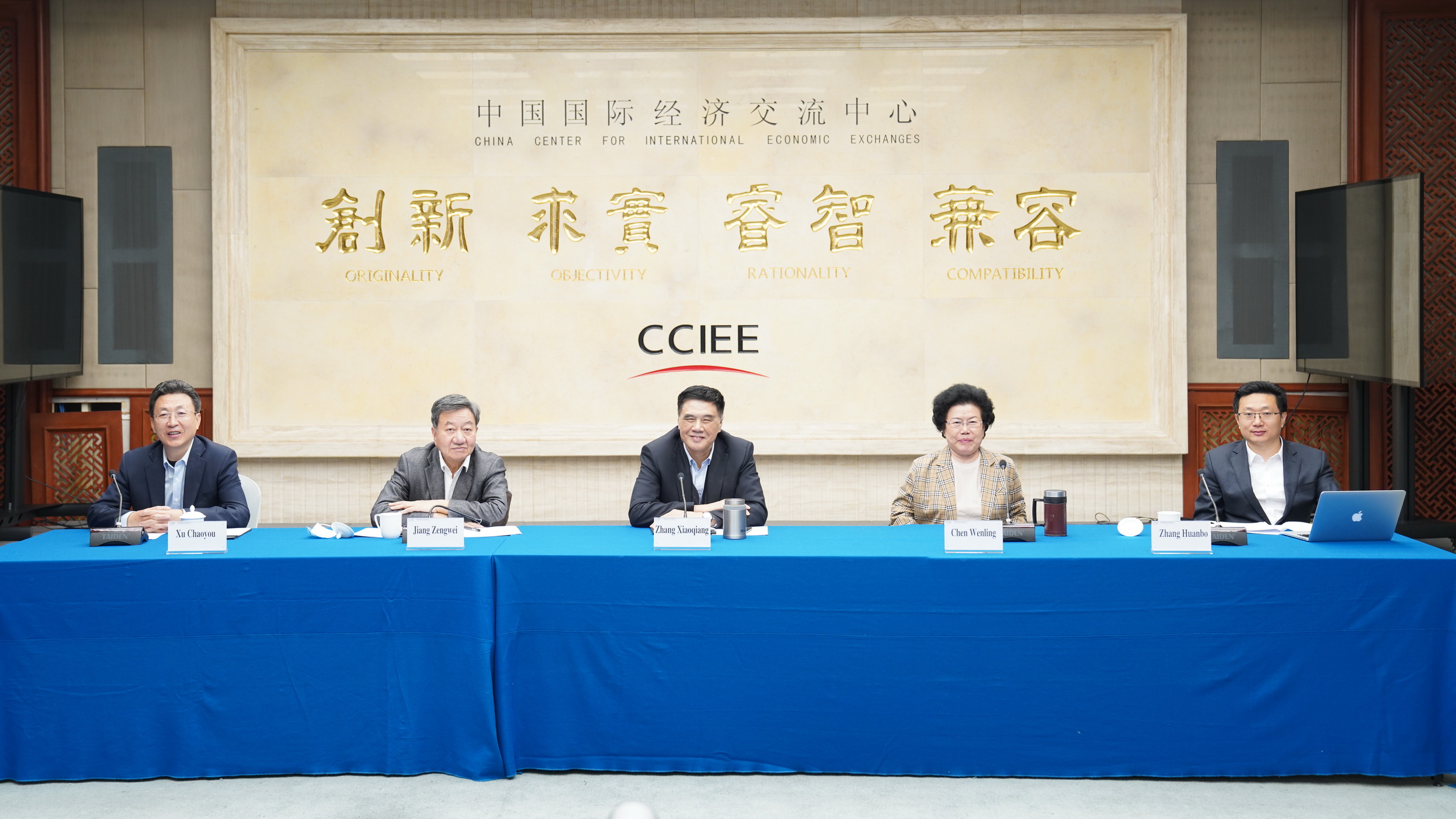Roundtable on U.S.-China Economic and Trade Relations Is Co-Hosted Online by CCIEE and Brookings
- Time:2021-11-11
- source:CCIEE
On 2 November, 2021, Roundtable on U.S.-China Economic and Trade Relations was co-organized online by China Center for International Economic Exchanges (CCIEE) and the Brookings Institution, with discussions focusing on topics of China-U.S. economic and trade relations, enhancing coordination of macroeconomic policies, China-U.S. cooperation in climate and green investment, and China-U.S. competition and collaboration in science and technology. Zhang Xiaoqiang, Executive Vice Chairman and CEO of CCIEE, and Jiang Zengwei, Vice Chairman of CCIEE, addressed the Roundtable.

Zhang Xiaoqiang stated in his welcoming remarks and keynote speech that China-U.S. relations are at a pivotal point, and whether both sides can properly handle bilateral relations is closely related to the future of both countries and the world. The heads of the state and senior officials of the two countries have conducted frank and in-depth dialogues on economic and trade relations and international affairs of common interests, leading to a positive shift in China-U.S. relations. Both sides should value the mutually beneficial nature of the China-U.S. economic and trade relations, and properly address the inevitable problems and disputes in spirit of mutual respect, equality, dialogue and consultation. China and the U.S. have interlinked, interdependent and resilient economic and trade ties, which cannot be cut off arbitrarily. The decoupling of economic relations and launching any of trade war go against the law of economic development and deviate from the practical demand, causing a result not only failing to address the challenges facing the two countries, but also cracking the stability and security of the global industry and supply chains. Enhancing dialogues and deepening cooperation are the expectation shared by people from all walks of life from both countries, and think tanks are supposed to play a constructive role in pushing the bilateral relations back on normal track.

Zhang Xiaoqiang mentioned that China will continue to improve its industrial policies to be more inclusive and functional in promoting fair competition, and strengthen the fundamental status of competition policies. As China endeavors to push forward the new development paradigm of dual circulation and establish a high-level open economy, it will gradually and in an orderly fashion open the internet, culture and health sectors, loosen the restrictions on business scope and personnel qualifications for foreign investment in legal service and transportation sectors, and further shorten the negative list for market access. China and the U.S. could give priority to collaborations in the coordination of macroeconomic policies, global economic governance, and climate change, so as to push the bilateral economic and trade ties back to the normal.

Jiang Zengwei concluded that as the largest developing and developed countries respectively, China and the U.S. have maintained a close partnership in trade for years, substantially benefitting the people from both sides. The economic and trade relations have become the ballast stone and propeller of bilateral relations, the change in which would cast a great impact on the global political and economic landscape. Confrontation is not in line with the interests of the people in both countries, while cooperation is the only right choice for the two countries. With continuous impact of the pandemic, the global economic recovery is reaching a critical stage that faces various uncertain and unstable factors, urging countries including China and the U.S. to develop sound and stable bilateral relations and enhance collaboration. The two governments, business communities and think tanks should proceed from the perspective of the long-term interests of the two countries and the prosperity and development of the world, conduct communications on the basis of equality and mutual respect, and strengthen coordination and collaboration on climate change, pandemic prevention and control, economic recovery and other major global and regional issues with joint efforts, better benefiting people of the two countries and the globe.
U.S. participants deemed that U.S.-China economic and trade relations are facing major challenges, which asks the two governments for specific measures to ensure the sustainable development of bilateral relations. Despite of the problems and disputes, bilateral investment and trade still have kept grwoing against the global economic downtrend, with continuous development on the micro level. The two sides should strengthen coordination of macroeconomic policies, properly handle disputes in manufacturing and high technologies, jointly address climate change by optimizing mechanisms, encouraging green technologies and investment collaboration between companies, and providing assistance of green technologies. More collaborations are expected in technological innovation and digital economy while more efforts are expected in addressing the differences regarding technology transfer instead of technology decoupling and crackdown, so as to realize the mutually beneficial cooperation between China and the U.S.
More than 20 participants attended the Roundtable, including Liu Yanhua, former Vice Minister of Science and Technology and former Chairman of the National Expert Committee on Climate Change, Chen Wenling, Chief Economist and Deputy Director of Board of Executives of CCIEE, Zhang Huanbo, Head of Institute of American and European Studies of CCIEE, Zhang Yuncheng, Director of Institute of World Economics Studies of China Institutes of Contemporary International Relations, Li Daokui, Director of Institute for Chinese Economic Practice and Thinking of Tsinghua University, Wu Xinbo, Director of Center for American Studies of Fudan University, Zheng Yongnian, Presidential Chair Professor of the Chinese University of Hong Kong, Shenzhen, Xu Lin, Chairman of the China-U.S. Green Fund, Liang Hong, Director of the Institute of Innovation and Industry Studies of Hillhouse Capital, David Dollar, Senior Fellow of John L. Thornton China Center of the Brookings Institution, Li Cheng, Director and Senior Fellow of John L. Thornton China Center of the Brookings Institution, Chen Xiaoyang, Professor of Economics and International Affairs of George Washington University, Huang Yuchuan, Senior Fellow in the Asia Program of Carnegie Endowment for International Peace, Nicholas R. Lardy, Senior Fellow at the Peterson Institute for International Economics, and some other experts and researchers from the Brookings Institution.
